Life As An Incarcerated Firefighter
Air Date: Week of January 31, 2025
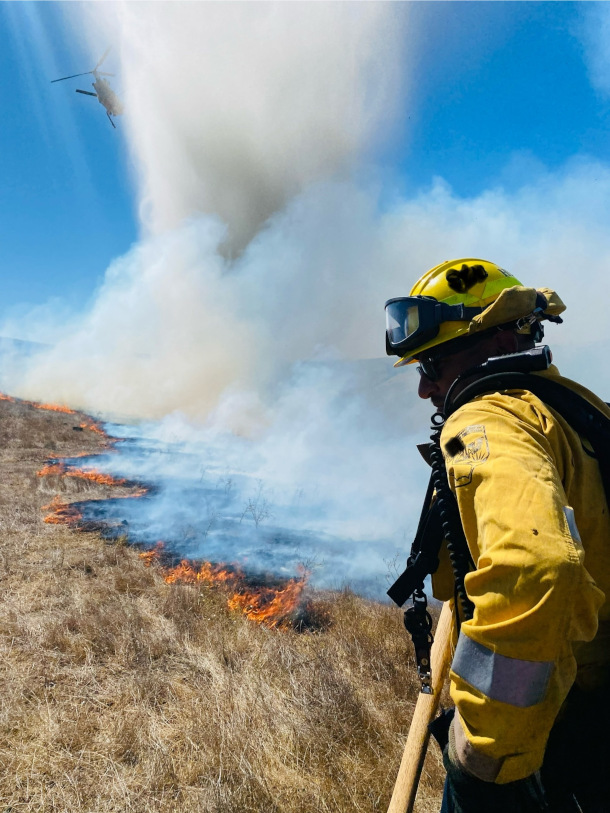
Eddie says that incarcerated fire fighters face greater risk from the health effects of smoke inhalation if they don’t get access to the high-quality healthcare free firefighters receive. (Photo: Courtesy of Eddie Herrera Jr.)
Around a thousand of the firefighters who battled blazes around southern California in January 2025 were incarcerated. They do essentially the same work as other firefighters but are paid as little as around $5 a day. Eddie Herrera Jr. shares with Host Aynsley O’Neill what it was like to serve as an incarcerated firefighter, and how the experience helped him forge a new life after prison as a professional firefighter.
Transcript
DOERING: It’s Living on Earth, I’m Jenni Doering
O’NEILL: And I’m Aynsley O’Neill.
The wildfires that have burned entire neighborhoods in Los Angeles this January took a massive response from firefighters to start to get under control. According to state officials more than 16,000 personnel battled the blazes across southern California at the height of the disaster. And over 1,000 of those people are currently serving prison sentences. While incarcerated firefighters do the same work as their counterparts, they are paid much less, as little as $5.80 a day. Here to talk to us about his experience in the program is Eduardo Herrera Jr. Eddie served eighteen years in prison and spent the final two of them as a firefighter. Now, he’s a professional firefighter for the state of California. Hi Eddie, welcome to Living on Earth!
HERRERA: Thank you for having me, pleasure to be here.
O'NEILL: So I understand that you were an incarcerated firefighter between 2019 and 2020, what is the day to day life like for an incarcerated firefighter?
HERRERA: So for me, it’s very unique. I actually lived at a firehouse. So my title was Institutional Municipal Firefighter. So what you would see in your normal municipal firehouse was very much the day to day, other than me being incarcerated, obviously. So I got up in the morning, did my training, did my six minutes of safety and weather, and then started my day running calls or just doing training.
O'NEILL: And now is that the standard setup, or was yours a unique case?
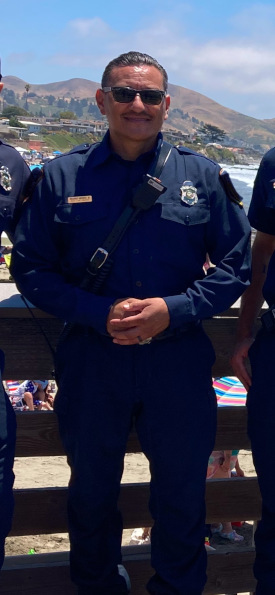
Eddie Herrera Jr. is a professional firefighter for the state of California. (Photo: Courtesy of Eddie Herrera Jr.)
HERRERA: So in the state of California, every adult prison has a firehouse to service the prison system itself, but that also some of them have what we call a mutual aid contract. And not all of them do. But in my case, mine had a strong mutual aid contract with the county I service, and so that therefore you service the community where you're housed at. But to be clear, that station is outside the prison grounds.
O'NEILL: And now, we're talking about this in terms of wildfires. But was that the majority of calls that you were taking, or were there other types as well?
HERRERA: For the most part, it's a lot of medical calls, but there's definitely a balance between vegetation fires, wildland fires, vehicle accidents, residential structure fires, rescues. So depending how the season goes or the call volume is, it can vary.
O'NEILL: And how did you become involved in this program in the first place?
HERRERA: So I started with requesting to be there. I had to work my way down and go through a vetting process, and obviously applying, and then going through an interview process with the captain of the firehouse, and then upon completion of the interview, then I was able to go through an actual testing process. It takes approximately two and a half months to three months, and you do the cycle motor skills, and then you also do the academic and curriculum part of it. So completing that, once you upon completing that, now you actually can shadow but if you do not complete that, then you actually go back to the prison you're housed at and you're not in the program.
O'NEILL: And now there's been a lot of discussion surrounding fair compensation with incarcerated firefighters, especially in the light of these recent wildfire outbreaks in California. During your time, when you were incarcerated, how much were you paid for your firefighting work, and how did you feel about that compensation?
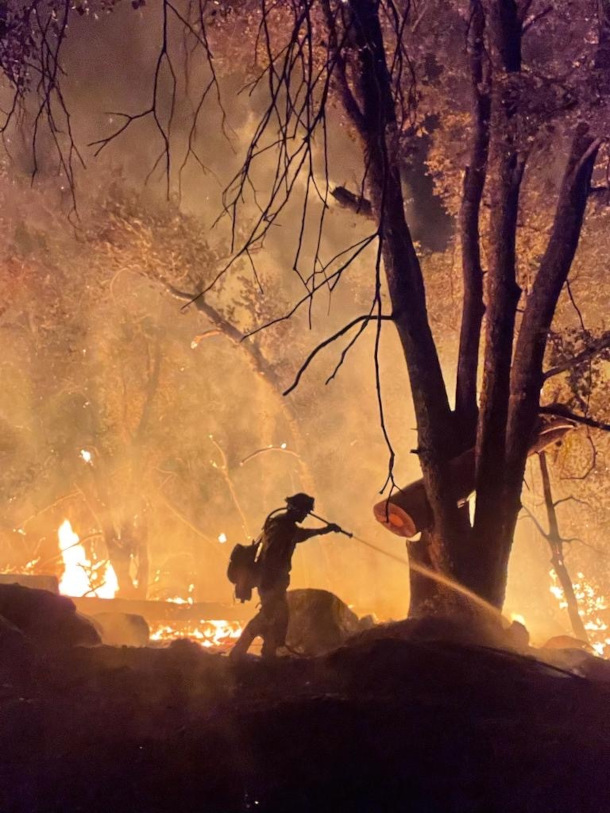
Incarcerated firefighters are currently fighting the L.A. wildfires while getting paid well below minimum wage. (Photo: Courtesy of Eddie Herrera Jr.)
HERRERA: So it's very different. I will say I got paid a lot less than your fire camp or wildland firefighters. I figured, since we were servicing the community and actually going into people's houses to perform medical and mitigate those situations and actually being close to the community, I thought it would be more, but it was actually $56 a month. That was the max I would make. It didn't matter if I was running a residential structure fire, saving a house, or CPR call. It did not matter. I was still going to make $56 a month. So it's very little compared to what you make in fire camp. When you're actually fighting a fire, you make $1 an hour. So if you're out on a fire and that fire lasts three weeks, you do the math, it can add up.
O'NEILL: And now there's special concerns about this low compensation given the round-the-clock firefighting that is happening, especially with California opening the program up to inmates under 26. How do you respond to concerns about this?
HERRERA: Well, I definitely think that we should be compensated a lot more than what we're getting paid. I mean, simply put as this, we're doing the job, and now the public is is starting to see it, because we do save property. We do save lives, right? And so how can you put a price on that? And at the end of the day, like, the big picture is you do it because you believe in yourself. You want to demonstrate, you know, that you're not defined by your crime. But, I mean, let's be realistic, the amount of pay that you're making is really nothing compared to what an actual individual that does do the exact same thing gets paid a lot more. Not only that, gets a pension, right, and gets great medical service. And we, as inmate firefighters or incarcerated firefighters, are more exposed to smoke inhalation, and we're in the front lines, and so therefore those health issues affect us directly. So being in prison shouldn't be a death sentence, you know. So I totally think that there should be some compensation in regards to that, because at the end of the day, when you are released from the program, there's a very likelihood that you have some health issues moving forward in your life.
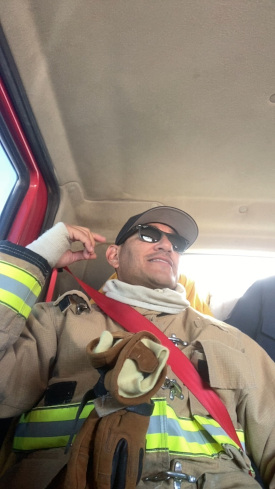
Inmate firefighters receive all of the standard firefighting training while incarcerated, but if they want to continue with the career after their release, they must go through nearly identical training all over again. (Photo: Courtesy of Eddie Herrera Jr.)
O'NEILL: So as I understand it, you were trained to be a firefighter while incarcerated, and then after release, you had to undergo the same training all over again?
HERRERA: That is correct. So me, as an institutional municipal firefighter, all the training that I did there, I did it all over again when I went to the Ventura Training Center. But as far as the job itself, it's still the same. And the same thing as wildland firefighters that are in fire camp, you get the exact same wildland training because you're already doing the job, the work. So it's no different, but just with the training that I had, I could have done the job when I came home. But the one thing I will say is that most important is, it's invaluable, is the experience. Because I had more experience than some of these firefighters that are out now, that are 18, 19-year-olds that are working as firefighters. I had 14 structure fires under my belt, vehicle fires, countless CPRs, medical calls, and wildland fires, and was already doing the job. I will share with you this one call that I ran, saving a residential structure fire, pulling up, seeing it on fire, extinguishing the fire, but finding out afterwards it was a correctional officer's house, and them coming to me and my partner's hands and shaking her hand and saying, "Thank you for saving our house." So these are the things that we're capable of doing. That, in itself, demonstrates that that we can do the job. Who better than individuals that were previously incarcerated, that want redemption, want to prove themselves? We are one of the hardest workers out there, and we've demonstrated it time and time again, consistently.
O'NEILL: Now there's a noted connection between personal history of trauma and incarceration. And then on top of that, we recently covered how merely being exposed to wildfires is traumatizing in and of itself, not to mention actually fighting these fires. So that's trauma on top of trauma. How do you and your fellow former inmates or the current inmates cope with the mental health aspect of this?
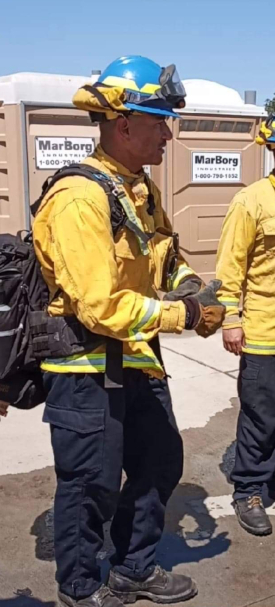
While incarcerated, Eddie responded to a full range of calls from CPR calls at the prison to saving the house of a correction officer. (Photo: Courtesy of Eddie Herrera Jr.)
HERRERA: Great question, and I think that that is one of the biggest challenge. For me, I'll speak on my personal experiences. I did a lot of work prior to going to the firehouse, before I even started running calls and fire calls, so I developed coping skills, resiliency. However, there is a lot of trauma when you see things and experience that, as far as running wildland fire calls or just calls in general. And so when you see these things, you're taking them in, and they're just there. And if you don't know how to process them, eventually they come out. And so an individual that is currently incarcerated, seeing all this devastation, seeing these fires, is on heightened alert, always, high stress level situation, and then comes home, is released in society, and then now sees it again. They're triggered. And so being able to have things in place, as for instance, mental health, you know, addressing mental health is very important. And we don't, unfortunately; in the fire service or as an incarcerated firefighter, there's a stigma that goes with that that mental health. So a lot of people don't ask for help. I do believe that as an incarcerated firefighter and individuals are still incarcerated, it’s so important to address these issues, because upon coming home, just something like the smell of smoke or hearing the sirens can trigger it, you know? And so I think it's very important for that to be addressed now and recognized now.
O'NEILL: What do you want people to know about either incarceration, generally speaking, or specifically the experience of incarcerated firefighters?
HERRERA: Yes. So it makes me think about, I'm paraphrasing here, but a quote by Dostoevsky where he says, "You can tell a lot about a country by how it treats its prisoners." And so for me, the way I look at it is, well, how it treats his heroes, because an incarcerated firefighter is now deemed as a hero. So I think that that's very important, because we're no longer defined by our mistake that we've made. We're going to come home. 90% of the population that are currently incarcerated are coming home. What kind of people do you want them to come home to? Do you want an inviting society, and if so, demonstrate it in actions: allow the opportunities to be able to have programs, classes, just stuff, so they can come home as better people. I would say, for the general public and individuals that are now experiencing this to think about that, because the key to it is this one word is, is hope. We all want hope and hope for change, right? And that's exactly what myself and individuals who have been incarcerated, that's what allows us to survive and move forward, is that hope.
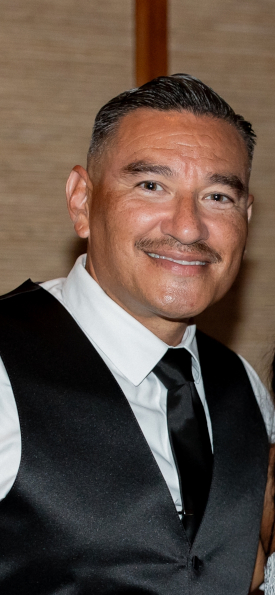
Eddie is grateful for the redemption that the incarcerated firefighting program offered him. He wants everyone to know that inmates are more than the crimes they are incarcerated for. (Photo: Courtesy of Eddie Herrera Jr.)
O'NEILL: We've talked a bit about the concept of redemption and change as it relates to this program. What kind of support is needed from the wider world when these formerly incarcerated firefighters and these former inmates, generally speaking, are coming home?
HERRERA: So one of the biggest way you can support us is changing laws. In life, our words are validated by our actions. So if people really want to create change, they have to be willing to show up. And showing up is in the polls, is when they see something that's injustice, see something that's not right, is put it into action and change those laws. Because you guys are our voices. We don't have a right to vote. So for the public, what I would like to see changes is demonstrated in action by showing up and changing those laws that don't allow us to get paid what we should be getting paid, allowing us to have the funding, to be able to have classes and training in place, that if you are an incarcerated firefighter, therefore you're able to get the actual accreditation while you're still incarcerated, since you're already doing the job, so therefore when you are released, it's a lot easier for you to transition into that job and become a career firefighter. So I'm grateful that we're having this discussion now, because it's personal to me. So thank you.
O'NEILL: Eddie Herrera, Jr. is a professional firefighter for the state of California. Eddie, thank you for giving us some of your time today.
HERRERA: Absolutely. Thank you for having me. I'm humbled just by being able to be here and speak with you.
Links
Learn more about the Anti-Recidivism Coalition.
High Country News | "What it’s like to be an incarcerated firefighter"
Living on Earth wants to hear from you!
Living on Earth
62 Calef Highway, Suite 212
Lee, NH 03861
Telephone: 617-287-4121
E-mail: comments@loe.org
Newsletter [Click here]
Donate to Living on Earth!
Living on Earth is an independent media program and relies entirely on contributions from listeners and institutions supporting public service. Please donate now to preserve an independent environmental voice.
NewsletterLiving on Earth offers a weekly delivery of the show's rundown to your mailbox. Sign up for our newsletter today!
 Sailors For The Sea: Be the change you want to sea.
Sailors For The Sea: Be the change you want to sea.
 The Grantham Foundation for the Protection of the Environment: Committed to protecting and improving the health of the global environment.
The Grantham Foundation for the Protection of the Environment: Committed to protecting and improving the health of the global environment.
 Contribute to Living on Earth and receive, as our gift to you, an archival print of one of Mark Seth Lender's extraordinary wildlife photographs. Follow the link to see Mark's current collection of photographs.
Contribute to Living on Earth and receive, as our gift to you, an archival print of one of Mark Seth Lender's extraordinary wildlife photographs. Follow the link to see Mark's current collection of photographs.
 Buy a signed copy of Mark Seth Lender's book Smeagull the Seagull & support Living on Earth
Buy a signed copy of Mark Seth Lender's book Smeagull the Seagull & support Living on Earth

